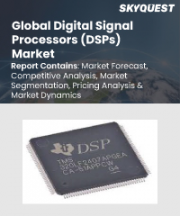
|
시장보고서
상품코드
1675724
오디오 DSP 시장 : 유형별, 최종 용도별, 지역별(2025-2033년)Audio DSP Market by Type (Discrete, Integrated), End Use (Phones, IoT, Home Entertainment, Computer, True Wireless Earphones, Smart Homes, Wearables, and Others), and Region 2025-2033 |
||||||
세계의 오디오 DSP 시장 규모는 2024년에 169억 달러에 달했습니다. 향후 IMARC Group은 2033년에는 343억 달러에 달하며, 2025-2033년의 성장률(CAGR)은 7.73%에 달할 것으로 예측하고 있습니다. 오디오 DSP 프린터의 수요 증가, 무선 접속의 보급, 현저한 기술개발이 시장을 촉진하는 주요 요인의 일부입니다.
오디오 DSP(디지털 신호 프로세서)는 음향 신호를 조작하면서 주파수, 효율, 성능을 최적화하고 개선하는 특수 마이크로프로세서 디지털 칩을 말합니다. 일반적으로 기존의 금속-산화막-반도체(MOS) 집적회로 칩으로 제조됩니다. 오디오 DSP는 일반적으로 음성, 오디오, 비디오, 온도, 위치, 압력 등 다양한 세계 신호를 추출하고 수학적으로 분석합니다. 기존의 제어 처리 장비(CPU)에 비해 오디오 DSP는 전력 소비를 최소화합니다. 또한 가장 사실적인 음향 효과를 제공하고, 음향 선명도를 향상시키고, 전체 볼륨을 증가시키고, 전력 소비를 최소화하고, 신호 조작을 가능하게 하고, 왜곡을 완화하고, 배경 소음을 제거할 수 있습니다. 그 결과, 오디오 DSP는 헤드폰, 사운드 네비게이션 레인지링(SONAR), 음성인식 시스템, 스튜디오 오디오 장비, 스마트폰, 디스크 드라이버, 고화질 TV(HDTV) 제품 등 다양한 용도로 활용되고 있습니다.
오디오 DSP 시장 동향 :
전자 분야의 대폭적인 확대와 전화, 태블릿, 데스크톱, 오디오 시스템 등 여러 소비자 전자기기에 대한 수요 증가가 현재 시장 성장을 주도하는 주요 요인입니다. 이에 따라 스마트홈의 정착이 진행되면서 음성인식, 보안 시스템, 블루투스 오디오 코덱 등 다양한 무선통신 시스템에 대한 수요가 증가하고 있는 것도 성장을 가속하는 요인으로 작용하고 있습니다. 또한 주택 인프라에 홈시어터 솔루션이 광범위하게 설치되면서 오디오 DSP의 사용이 촉진되어 개인에게 몰입감 있는 시청 경험을 제공할 수 있게된 것도 시장을 촉진하고 있습니다. 또한 소비자의 자동차 지향성이 강화됨에 따라 제조업체들은 다양한 차량용 기기에 오디오 DSP를 탑재하고 있으며, 이는 시장 성장을 가속하고 있습니다. 이러한 솔루션은 차선이탈 경고, 사각지대 감지, 주차 보조 장비, 어댑티브 컨트롤 크루즈, 충돌 방지 기술 등에 사용되어 차량용 오디오 시스템의 음질을 향상시키고 있습니다. 또한 디지털 카메라, 프린터, 셋온박스, 위치 기반 서비스, 비디오 감시, 디지털 이미지 처리 솔루션에 오디오 DSP가 광범위하게 사용되고 있는 것도 시장 성장에 긍정적인 영향을 미치고 있습니다. 이와는 별도로, 인공지능(AI), 사물인터넷(IoT), 지능형 엣지 컴퓨팅의 대규모 통합은 상당한 기술 발전과 광범위한 조사 개발(R&D) 활동과 함께 전 세계에서 시장 전망을 더욱 밝게 하고 있습니다.
이 보고서에서 다룬 주요 질문
- 세계 오디오 DSP 시장은 지금까지 어떻게 추이해 왔으며, 향후 어떻게 추이하는가?
- 세계 오디오 DSP 시장 성장 촉진요인, 저해요인, 기회는 무엇인가?
- 주요 지역 시장은?
- 가장 매력적인 오디오 DSP 시장은 어느 국가인가?
- 유형별 시장 분석은?
- 최종 용도별 시장 분석은?
- 세계 오디오 DSP 시장 경쟁 구도는?
- 세계 오디오 DSP 시장의 주요 기업은?
목차
제1장 서문
제2장 조사 범위와 조사 방법
- 조사의 목적
- 이해관계자
- 데이터 소스
- 1차 정보
- 2차 정보
- 시장 추정
- 보텀업 어프로치
- 톱다운 어프로치
- 조사 방법
제3장 개요
제4장 서론
- 개요
- 주요 업계 동향
제5장 세계의 오디오 DSP 시장
- 시장 개요
- 시장 실적
- COVID-19의 영향
- 시장 예측
제6장 시장 내역 : 유형별
- 디스크리트
- 통합
제7장 시장 내역 : 최종 용도별
- 전화
- IoT
- 홈엔터테인먼트
- 컴퓨터
- 완전 무선 이어폰
- 스마트홈
- 웨어러블
- 기타
제8장 시장 내역 : 지역별
- 북미
- 미국
- 캐나다
- 아시아태평양
- 중국
- 일본
- 인도
- 한국
- 호주
- 인도네시아
- 기타
- 유럽
- 독일
- 프랑스
- 영국
- 이탈리아
- 스페인
- 러시아
- 기타
- 라틴아메리카
- 브라질
- 멕시코
- 기타
- 중동 및 아프리카
- 시장 내역 : 국가별
제9장 촉진요인·억제요인·기회
- 개요
- 촉진요인
- 억제요인
- 기회
제10장 밸류체인 분석
제11장 Porter's Five Forces 분석
- 개요
- 바이어의 교섭력
- 공급 기업의 교섭력
- 경쟁의 정도
- 신규 진출업체의 위협
- 대체품의 위협
제12장 가격 분석
제13장 경쟁 구도
- 시장 구조
- 주요 기업
- 주요 기업의 개요
- Advanced Micro Devices Inc.
- Analog Devices Inc.
- CEVA Inc
- NXP Semiconductors N.V.
- Qualcomm Incorporated
- Renesas Electronics Corporation
- Texas Instruments Incorporated
- Yamaha Corporation
The global audio DSP market size reached USD 16.9 Billion in 2024. Looking forward, IMARC Group expects the market to reach USD 34.3 Billion by 2033, exhibiting a growth rate (CAGR) of 7.73% during 2025-2033. The increasing demand for audio DSP printers, the widespread adoption of wireless connectivity, and significant technological developments represent some of the key factors driving the market.
Audio digital signal processor (DSP) refers to a specialized microprocessor digital chip that manipulates acoustic signals while optimizing and improving its frequency, efficiency, and performance. It is usually fabricated on traditional metal-oxide-semiconductor (MOS) integrated circuit chips. Audio DSP generally draws various world signals, such as voice, audio, video, temperature, position, and pressure that are further mathematically analyzed. As compared to traditional control processing units (CPU), audio DSP consumes minimal power. Additionally, it offers the most realistic sound effects, improves acoustic clarity, increases overall volume, consumes minimal power, enables signal manipulation, mitigates distortion, and allows background noise cancellation. As a result, audio DSP finds extensive applications in headphones, sound navigation and ranging (SONAR), speech recognition systems, studio audio gears, smartphones, disk drivers, and high-definition television (HDTV) products.
Audio DSP Market Trends:
The significant expansion in the electronics sector and the increasing demand for several consumer electronic devices, such as telephones, tablets, desktops, and audio systems, are major factors currently driving the market growth. In line with this, the ongoing establishment of smart homes and the rising demand for various wireless communication systems, including voice recognition and security systems and Bluetooth audio codecs, is acting as another growth-inducing factor. The market is further driven by the widespread installation of home theater solutions across residential infrastructure, which has facilitated the usage of audio DSP to provide immersive viewing experiences to individuals. Additionally, the shifting consumer inclination toward automobiles with enhanced capabilities has prompted manufactures to install audio DSP in diverse vehicle equipment, which, in turn, is supporting the market growth. Such solutions are used in lane departure warnings, blind spot detection, parking assistance devices, adaptive control cruise, and collision avoidance technologies to improve sound quality in-car audio systems. Furthermore, the extensive usage of audio DSP in digital cameras, printers, set-op-box, location-based services, video surveillance, and digital image processing solutions is favoring the market growth. Apart from this, the large-scale integration of artificial intelligence (AI), the Internet of Things (IoT), intelligent edge computing, along with significant technological advancements and extensive research and development (R&D) activities are creating a positive outlook for the market further across the globe.
Key Market Segmentation:
Type Insights:
- Discrete
- Integrated
- The report has also provided a detailed breakup and analysis of the audio DSP market based on the type. This includes discrete and integrated. According to the report, integrated represented the largest segment.
End Use Insights:
- Phones
- IoT
- Home Entertainment
- Computer
- True Wireless Earphones
- Smart Homes
- Wearables
- Others
Regional Insights:
- North America
- United States
- Canada
- Asia Pacific
- China
- Japan
- India
- South Korea
- Australia
- Indonesia
- Others
- Europe
- Germany
- France
- United Kingdom
- Italy
- Spain
- Russia
- Others
- Latin America
- Brazil
- Mexico
- Others
- Middle East and Africa
- The report has also provided a comprehensive analysis of all the major regional markets that include North America (the United States and Canada); Asia Pacific (China, Japan, India, South Korea, Australia, Indonesia, and others); Europe (Germany, France, the United Kingdom, Italy, Spain, Russia, and others); Latin America (Brazil, Mexico, and others); and the Middle East and Africa. According to the report, Asia Pacific was the largest market for audio DSP. Some of the factors driving the Asia Pacific audio DSP market included the widescale integration with artificial intelligence (AI) and internet of things (IoT), increasing need for wireless connectivity, and the rising demand for consumer electronics.
Competitive Landscape:
- The report has also provided a comprehensive analysis of the competitive landscape in the global audio DSP market. Detailed profiles of all major companies have also been provided. Some of the companies covered include Advanced Micro Devices Inc., Analog Devices Inc., CEVA Inc, NXP Semiconductors N.V., Qualcomm Incorporated, Renesas Electronics Corporation, Texas Instruments Incorporated, Yamaha Corporation, etc.
Key Questions Answered in This Report:
- How has the global audio DSP market performed so far and how will it perform in the coming years?
- What are the drivers, restraints, and opportunities in the global audio DSP market?
- What are the key regional markets?
- Which countries represent the most attractive audio DSP markets?
- What is the breakup of the market based on the type?
- What is the breakup of the market based on the end use?
- What is the competitive structure of the global audio DSP market?
- Who are the key players/companies in the global audio DSP market?
Table of Contents
1 Preface
2 Scope and Methodology
- 2.1 Objectives of the Study
- 2.2 Stakeholders
- 2.3 Data Sources
- 2.3.1 Primary Sources
- 2.3.2 Secondary Sources
- 2.4 Market Estimation
- 2.4.1 Bottom-Up Approach
- 2.4.2 Top-Down Approach
- 2.5 Forecasting Methodology
3 Executive Summary
4 Introduction
- 4.1 Overview
- 4.2 Key Industry Trends
5 Global Audio DSP Market
- 5.1 Market Overview
- 5.2 Market Performance
- 5.3 Impact of COVID-19
- 5.4 Market Forecast
6 Market Breakup by Type
- 6.1 Discrete
- 6.1.1 Market Trends
- 6.1.2 Market Forecast
- 6.2 Integrated
- 6.2.1 Market Trends
- 6.2.2 Market Forecast
7 Market Breakup by End Use
- 7.1 Phones
- 7.1.1 Market Trends
- 7.1.2 Market Forecast
- 7.2 IoT
- 7.2.1 Market Trends
- 7.2.2 Market Forecast
- 7.3 Home Entertainment
- 7.3.1 Market Trends
- 7.3.2 Market Forecast
- 7.4 Computer
- 7.4.1 Market Trends
- 7.4.2 Market Forecast
- 7.5 True Wireless Earphones
- 7.5.1 Market Trends
- 7.5.2 Market Forecast
- 7.6 Smart Homes
- 7.6.1 Market Trends
- 7.6.2 Market Forecast
- 7.7 Wearables
- 7.7.1 Market Trends
- 7.7.2 Market Forecast
- 7.8 Others
- 7.8.1 Market Trends
- 7.8.2 Market Forecast
8 Market Breakup by Region
- 8.1 North America
- 8.1.1 United States
- 8.1.1.1 Market Trends
- 8.1.1.2 Market Forecast
- 8.1.2 Canada
- 8.1.2.1 Market Trends
- 8.1.2.2 Market Forecast
- 8.1.1 United States
- 8.2 Asia-Pacific
- 8.2.1 China
- 8.2.1.1 Market Trends
- 8.2.1.2 Market Forecast
- 8.2.2 Japan
- 8.2.2.1 Market Trends
- 8.2.2.2 Market Forecast
- 8.2.3 India
- 8.2.3.1 Market Trends
- 8.2.3.2 Market Forecast
- 8.2.4 South Korea
- 8.2.4.1 Market Trends
- 8.2.4.2 Market Forecast
- 8.2.5 Australia
- 8.2.5.1 Market Trends
- 8.2.5.2 Market Forecast
- 8.2.6 Indonesia
- 8.2.6.1 Market Trends
- 8.2.6.2 Market Forecast
- 8.2.7 Others
- 8.2.7.1 Market Trends
- 8.2.7.2 Market Forecast
- 8.2.1 China
- 8.3 Europe
- 8.3.1 Germany
- 8.3.1.1 Market Trends
- 8.3.1.2 Market Forecast
- 8.3.2 France
- 8.3.2.1 Market Trends
- 8.3.2.2 Market Forecast
- 8.3.3 United Kingdom
- 8.3.3.1 Market Trends
- 8.3.3.2 Market Forecast
- 8.3.4 Italy
- 8.3.4.1 Market Trends
- 8.3.4.2 Market Forecast
- 8.3.5 Spain
- 8.3.5.1 Market Trends
- 8.3.5.2 Market Forecast
- 8.3.6 Russia
- 8.3.6.1 Market Trends
- 8.3.6.2 Market Forecast
- 8.3.7 Others
- 8.3.7.1 Market Trends
- 8.3.7.2 Market Forecast
- 8.3.1 Germany
- 8.4 Latin America
- 8.4.1 Brazil
- 8.4.1.1 Market Trends
- 8.4.1.2 Market Forecast
- 8.4.2 Mexico
- 8.4.2.1 Market Trends
- 8.4.2.2 Market Forecast
- 8.4.3 Others
- 8.4.3.1 Market Trends
- 8.4.3.2 Market Forecast
- 8.4.1 Brazil
- 8.5 Middle East and Africa
- 8.5.1 Market Trends
- 8.5.2 Market Breakup by Country
- 8.5.3 Market Forecast
9 Drivers, Restraints, and Opportunities
- 9.1 Overview
- 9.2 Drivers
- 9.3 Restraints
- 9.4 Opportunities
10 Value Chain Analysis
11 Porters Five Forces Analysis
- 11.1 Overview
- 11.2 Bargaining Power of Buyers
- 11.3 Bargaining Power of Suppliers
- 11.4 Degree of Competition
- 11.5 Threat of New Entrants
- 11.6 Threat of Substitutes
12 Price Analysis
13 Competitive Landscape
- 13.1 Market Structure
- 13.2 Key Players
- 13.3 Profiles of Key Players
- 13.3.1 Advanced Micro Devices Inc.
- 13.3.1.1 Company Overview
- 13.3.1.2 Product Portfolio
- 13.3.1.3 Financials
- 13.3.1.4 SWOT Analysis
- 13.3.2 Analog Devices Inc.
- 13.3.2.1 Company Overview
- 13.3.2.2 Product Portfolio
- 13.3.2.3 Financials
- 13.3.2.4 SWOT Analysis
- 13.3.3 CEVA Inc
- 13.3.3.1 Company Overview
- 13.3.3.2 Product Portfolio
- 13.3.3.3 Financials
- 13.3.4 NXP Semiconductors N.V.
- 13.3.4.1 Company Overview
- 13.3.4.2 Product Portfolio
- 13.3.4.3 Financials
- 13.3.4.4 SWOT Analysis
- 13.3.5 Qualcomm Incorporated
- 13.3.5.1 Company Overview
- 13.3.5.2 Product Portfolio
- 13.3.5.3 Financials
- 13.3.5.4 SWOT Analysis
- 13.3.6 Renesas Electronics Corporation
- 13.3.6.1 Company Overview
- 13.3.6.2 Product Portfolio
- 13.3.6.3 Financials
- 13.3.6.4 SWOT Analysis
- 13.3.7 Texas Instruments Incorporated
- 13.3.7.1 Company Overview
- 13.3.7.2 Product Portfolio
- 13.3.7.3 Financials
- 13.3.7.4 SWOT Analysis
- 13.3.8 Yamaha Corporation
- 13.3.8.1 Company Overview
- 13.3.8.2 Product Portfolio
- 13.3.8.3 Financials
- 13.3.8.4 SWOT Analysis
- 13.3.1 Advanced Micro Devices Inc.
Kindly note that this only represents a partial list of companies, and the complete list has been provided in the report.


















